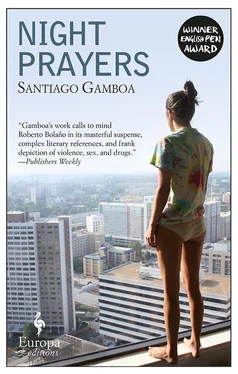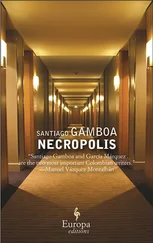We started walking back along Seventh looking for some transportation heading north, but the street was closed because of the demonstration so we had to go on foot, dodging puddles, from eave to eave, avoiding the rain. Father didn’t care about getting wet, but jealously protected the banner with the photograph of Juana, maybe he was trying to protect her; and so we walked side by side in silence in that ghostly city that is Bogotá in the rain.
Without knowing how, absorbed in our thoughts, we reached Chapinero, just as the black clouds dispersed and you could finally see a piece of the sky.
As we crossed Fiftieth and Seventh a black Mercedes passed us. One of its wheels hit a puddle and the water it threw up splashed our pants, making them even wetter than they already were. The driver turned and looked at me, just for a second, but long enough for me to recognize him. It was Edgar Porras.
The Mercedes moved away and I saw him looking at me in the rearview mirror, I hesitated for a moment, but then I grabbed Father’s arm and said, let’s carry on, old man, let’s walk a little more, it’s only just twelve-thirty, we should be in time for lunch.
Mother didn’t change. Whenever she mentioned Juana’s disappearance her voice was sad, but the tragedy didn’t seem to have shifted anything essential inside her. She carried on the same, and had her problems with Father. Luckily, I was almost never there at mealtimes.
Sometimes, Father would come into my room in the early hours. He would apologize and say, I saw the light was on, Manuel, can I come in for a while? I can’t get to sleep, dammit… He’d sit down on my bed, take a quart of aguardiente from the pocket of his dressing gown, and have a few slugs. He’d offer it to me and I’d say, I can’t sleep either, that’s why I’m reading. But he’d say, if only I could, Manuel, if only I could stop thinking. He’d sit there for a while in silence. Then we’d hug and he’d go. Seeing his resigned expression, I knew he would spend the night awake. His prayers, like mine, drifted up into the darkest part of the sky and faded away. There was nobody who could listen to them.
I told you that we never found out exactly when she disappeared, because she had gotten us used to her being away for long periods, and this was just the latest one; only when too much time had passed without her coming back did I decide to call her on her cell phone, and not getting any reply or any e-mail message, I realized that something was wrong. So I said to Father, do you know when Juana is coming back? And he looked worried and said, I was just about to ask you the same question, son, I don’t have any idea, how come you don’t know? That’s how it all started. That’s when we reported her missing and began the round of police stations, prisons, and hospitals.
Sometime later Mother said something that stayed in everybody’s heads, but which nobody dared to repeat. She said it to Father when he had come back from one of his fruitless visits to some hospital or courthouse.
Oh, Alberto, maybe she ended up with FARC.
She said it, and Father immediately put his hand over her mouth, a gesture that was meant to be strong but in fact was merely desperate.
Never say that again, Bertha. Ever.
Then he took out his handkerchief and dried his eyes.
I sought out her classmates, the friends who had known her. It was a long and difficult process, since I didn’t even know their names. It’s incredible how little we know of the people we love. Little by little, I tracked down some of them, but nobody knew anything. They told me vague things, that she had gone on a journey, that she was doing fieldwork. None of them thought it possible that she had gotten involved with the guerrillas, who were very discredited in the university. I said that one night to Father and he moved his head, as if to dismiss the thought, and said, I knew, I knew that, but thanks anyway, Manuel.
Father ended up lodging an official registration of her disappearance with the help of the NGO Caritas. From that day on, he devoted himself to studying disappearances in Colombia in the hope of finding some clue, some lead that would show him the path to follow. He also devoted himself to aguardiente for a while, but the pain from his ulcer soon put a stop to that. He and Mother didn’t talk much, at least not in front of me.
The worst thing about such situations is that life goes on.
A year passed, then another year. Father aged about ten years and Mother started taking control of things at home. The bank, knowing what had happened and seeing what bad shape he was in, told him he could take early retirement, and he thought about it seriously. But he preferred to carry on working. At home, the memory of Juana was just too strong and too sad.
I finished my philosophy degree and started a doctorate, and that’s when I studied aesthetics with Gustavo Chirolla. It was the best course I ever took. But although Gustavo was fond of me I never dared to talk to him about anything personal or try to be his friend. My fellow students were on friendly terms with him, they even went to his house, he was very open, a great guy. I was dying to do that but I never dared. I don’t know why, Consul. What had happened with Juana made me feel distant, and also guilty, very guilty. Because of everything I had lost, I wasn’t like the others. Without her, life wasn’t worthwhile. Mine, at least. I decided to wait a little while to see if a miracle would happen.
With time, the suffering turned into something secret, a little fire that united my father and me, even though we almost never mentioned it. I knew that it was there, nothing more.
But early one morning, I was woken by some kind of light, and I sat up in bed.
Juana was alive.
I could feel her presence, as if a wind filled with words had burst into the room, and in that magma, in that invisible net, there was her voice. I heard it. It was a voice surrounded by many voices, cries surrounded by many cries. I heard it. She was alive and I had to start looking for her again. Almost three years had passed.
Of course, I didn’t say anything to Father.
I decided to begin with Tania, the woman who’d initiated me into sex, and with whom I hadn’t spoken since. It took me two weeks to find her, but in the end I did. She wasn’t studying anymore, she never completed her course in systems engineering, and was now working in the IT department of the El Tiempo publishing group. On my way there, I remembered her Spanish boyfriend. The newspaper had been bought by Spaniards and I put two and two together. In the course of looking for her, I’d discovered that her real name wasn’t Tania but María Claudia. Tania was her student name, a very common name in her generation, I suppose because of Che Guevara’s girlfriend.
She received me in an office with a view of the hills, and I told her what had happened. Every now and again we heard the planes taking off from the runways of the airport. To persuade her to help me, I showed her the list of offices that we had scoured in the search for my sister, the civil and legal actions I’d started with my father. She was touched by all that, and decided to speak out.
Listen, I liked Juana very much, she helped me in lots of things and was always great to me. You can’t even imagine what I owe her. That’s why I’m going to start by telling you something you may not like, but it’s important that you know.
I looked at her nervously, swallowed, and said, tell me, please, whatever it is.
Juana was working for a former Miss Colombia who ran a modeling agency, she said, and after clearing her throat added: but it was more than just modeling, what the girls did was go out with men who had money. It was actually an escort agency, you know what that means?
Читать дальше












